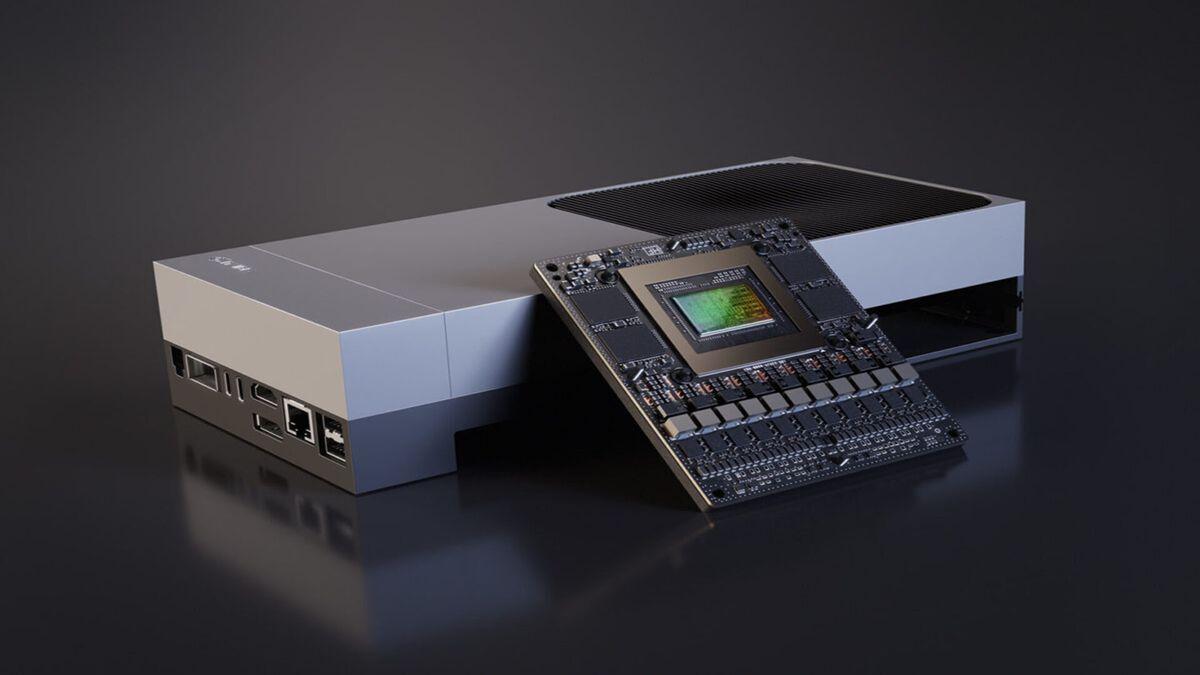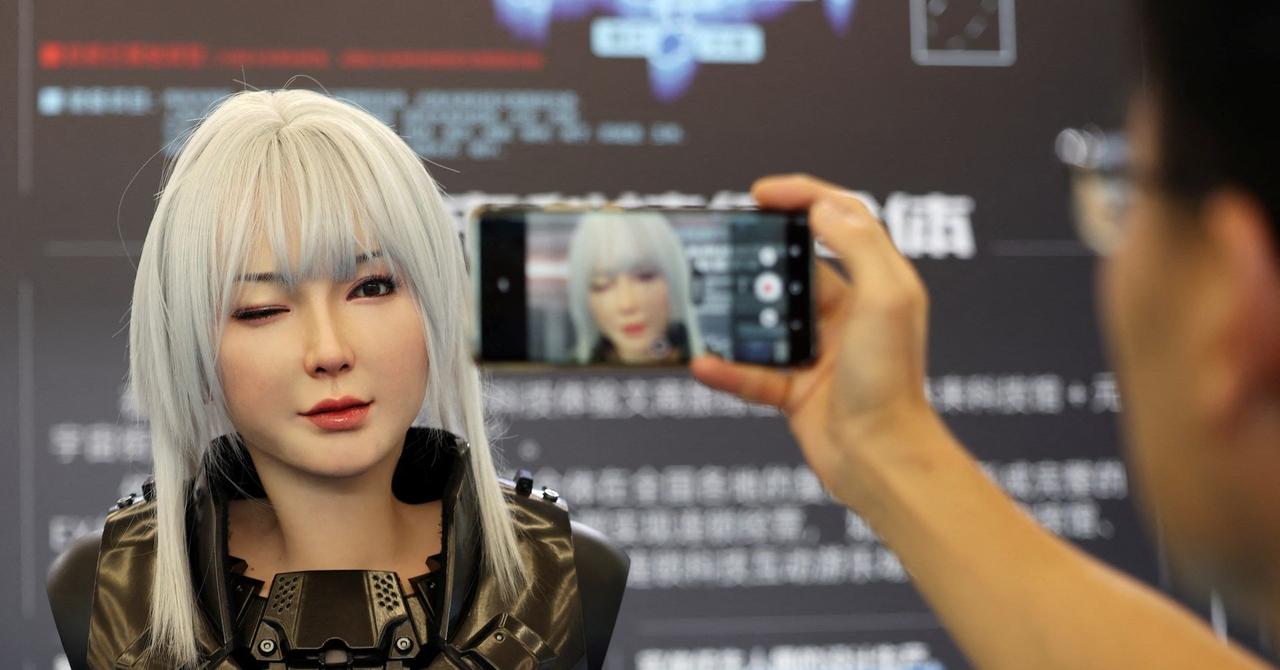Nvidia's Jetson Thor: Powering the Future of Humanoid Robotics by 2025
2 Sources
2 Sources
[1]
Nvidia Readies Jetson Thor Computers for Humanoid Robots in 2025
Nvidia is set to bring its new technology for powering humanoid robots to market in the first half of 2025, aiming to stake its claim in the fast-growing robotics sector, a senior company executive said. First unveiled earlier this year, the Jetson Thor computers are part of Nvidia's approach to developing human-like robots, where advances in artificial intelligence have improved autonomy, enabling robots to interact better with humans and their surroundings. Jetson Thor is the latest addition to Nvidia's Jetson platform, a line of compact computers designed for AI applications, with the new model now focused on robotics. At the company's annual conference in March, Chief Executive Jensen Huang showcased a range of robots on stage with him, making a splash of Nvidia's chips in these robotics systems. Rather than competing directly in robot manufacturing--a sector where companies like Tesla have leveraged advancements in electronics and battery--Nvidia positions itself as a technology provider, akin to how Google supplies the Android platform to phone manufacturers. Nvidia is targeting a fragmented market of "hundreds of thousands" of robot makers, in contrast to the concentrated smartphone market dominated by a few major players, Deepu Talla, Nvidia's vice president of robotics and edge computing, told reporters Wednesday on the sidelines of an Nvidia conference in Tokyo. "We're providing a platform for robots; we are not building a robot," said Talla, pointing to partnerships with robot manufacturers like Siemens and Universal Robots. Tesla's humanoid robot, Optimus, is expected to enter limited production by the end of 2025 for use within Tesla factories, with production likely ramping up for external customers by 2026, Tesla CEO Elon Musk said on X in July. Nvidia's Talla said the company supplies Tesla with technology for building humanoid robots, characterizing the automaker's push as "advancing the market." While autonomous vehicles have captured much attention in recent years, humanoid robotics also show significant potential. The technology could reshape human-machine interaction across various sectors, from manufacturing and construction to healthcare and home assistance. However, Talla said that widespread deployment of production-quality humanoid robots is unlikely in 2025. Humanoid robots are undergoing rapid development, led by major companies in the U.S. and China. To address issues such as labor shortages, China is making aggressive strides in humanoid robotics, from mechatronics to AI, Talla said. -- Asa Fitch and Becky Peterson contributed to this article.
[2]
Nvidia Powers Tesla's Humanoid Robots With New AI Tech: Here's What To Expect In 2025 - Netflix (NASDAQ:NFLX), Tesla (NASDAQ:TSLA)
Nvidia's new platform aims to improve robot autonomy, focusing on partnerships with Siemens, Universal Robots, and Tesla. Nvidia Corp NVDA is preparing to launch its latest technology for humanoid robots in the first half of 2025 as part of its strategy to enter the fast-evolving robotics industry. The company aims to establish a strong foothold by offering advanced computing solutions tailored for AI-driven robots, the Wall Street Journal cites a senior executive. The new Jetson Thor computers were introduced earlier this year and are designed to enhance the capabilities of human-like robots. Also Read: Taiwan Semi Boosts Advanced Chipmaking with Record EUV Expansion, Grabs 56% Global Share The technology aims to leverage advancements in artificial intelligence, boost robot autonomy, and improve their interactions with people and their environments. Nvidia's Jetson Thor marks the latest addition to its Jetson platform, a series of compact, high-performance computers developed for AI applications. During Nvidia's annual conference in March, CEO Jensen Huang highlighted the company's commitment to the robotics sector, demonstrating several robots powered by Nvidia's chips. Rather than building robots, Nvidia intends to provide the underlying technology, similar to how Google supplies Android for smartphones. Nvidia aims to cater to a broad, fragmented market of numerous robot manufacturers, contrasting with the smartphone industry, which a few large players dominate. Deepu Talla, Nvidia's Vice President of Robotics and Edge Computing, told the WSJ that the company has formed strategic partnerships with industry leaders like Siemens and Universal Robots to integrate its platform into various robotics solutions. Talla emphasized that Nvidia's role is to supply the computing platform for robots, while companies like Tesla Inc TSLA lead the development of physical robotic systems. Tesla's humanoid robot, Optimus, is set to begin limited production by late 2025, with plans for broader commercial availability by 2026. Nvidia is already providing key technology components to support Tesla's robotics initiatives. Nvidia joined forces with Hugging Face to boost robotics innovation using open-source AI technology. At the Conference for Robot Learning (CoRL) in Munich, Germany, the two companies unveiled a partnership to speed up robotics research by bringing together their open-source communities. The alliance integrates Hugging Face's LeRobot AI platform with Nvidia's AI, Omniverse, and Isaac's robotics systems, aiming to drive progress in manufacturing, healthcare, and logistics. Nvidia stock surged 204% year-to-date. Morgan Stanley's Joseph Moore noted that Nvidia's upcoming Blackwell chip launch is driving substantial revenue, potentially contributing $5 billion -- $6 billion in the first quarter. Moore highlights new growth catalysts for Nvidia, including AI PCs, autonomous vehicles, and per-car software licensing revenue. Nvidia's Data Center business is expected to lead long-term growth, powered by strong demand for AI and machine learning hardware. Investors can gain exposure to Nvidia through SPDR S&P 500 SPY and iShares Core S&P 500 ETF IVV. Price Action: NVDA stock is up 0.80% at $147.45 at the last check Thursday. Also Read: Nutanix Catalysts Include HCI Growth, VMware Market Share Shift, And AI Demand: Analyst Photo via Shutterstock This content was partially produced with the help of AI tools and was reviewed and published by Benzinga editors. Market News and Data brought to you by Benzinga APIs
Share
Share
Copy Link
Nvidia is set to launch its Jetson Thor computers for humanoid robots in early 2025, aiming to revolutionize the robotics industry with advanced AI capabilities and improved autonomy.

Nvidia's Ambitious Push into Humanoid Robotics
Nvidia, the tech giant known for its graphics processing units, is making significant strides in the robotics industry. The company is gearing up to launch its Jetson Thor computers, specifically designed for humanoid robots, in the first half of 2025
1
. This move positions Nvidia as a key player in the rapidly evolving field of advanced robotics.The Jetson Thor Platform
The Jetson Thor is the latest addition to Nvidia's Jetson platform, a series of compact computers optimized for AI applications. This new model focuses on enhancing the capabilities of human-like robots, leveraging advancements in artificial intelligence to improve autonomy and interaction with humans and their surroundings
1
.Nvidia's Strategic Approach
Rather than manufacturing robots directly, Nvidia is positioning itself as a technology provider, similar to Google's role in the smartphone market with Android. Deepu Talla, Nvidia's Vice President of Robotics and Edge Computing, emphasized that the company aims to cater to a fragmented market of "hundreds of thousands" of robot makers
1
.Partnerships and Collaborations
Nvidia has formed strategic partnerships with industry leaders such as Siemens and Universal Robots to integrate its platform into various robotics solutions
2
. The company is also supplying technology to Tesla for its humanoid robot, Optimus, which is expected to enter limited production by the end of 20251
.Market Potential and Future Outlook
While widespread deployment of production-quality humanoid robots is unlikely in 2025, the technology shows significant potential to reshape human-machine interaction across various sectors, including manufacturing, construction, healthcare, and home assistance
1
.Related Stories
Nvidia's Broader AI Initiatives
Beyond robotics, Nvidia is making strides in other AI-related areas. The company has partnered with Hugging Face to accelerate robotics innovation using open-source AI technology, integrating Hugging Face's LeRobot AI platform with Nvidia's AI, Omniverse, and Isaac robotics systems
2
.Financial Implications
Nvidia's stock has surged 204% year-to-date, reflecting investor confidence in the company's AI-driven growth strategy. Analysts predict that Nvidia's upcoming Blackwell chip launch could contribute $5 billion to $6 billion in revenue in the first quarter alone
2
.References
Summarized by
Navi
[1]
Related Stories
Recent Highlights
1
Google Gemini 3.1 Pro doubles reasoning score, beats rivals in key AI benchmarks
Technology

2
Nvidia and Meta forge massive chip deal as computing power demands reshape AI infrastructure
Technology

3
ChatGPT cracks decades-old gluon amplitude puzzle, marking AI's first major theoretical physics win
Science and Research








